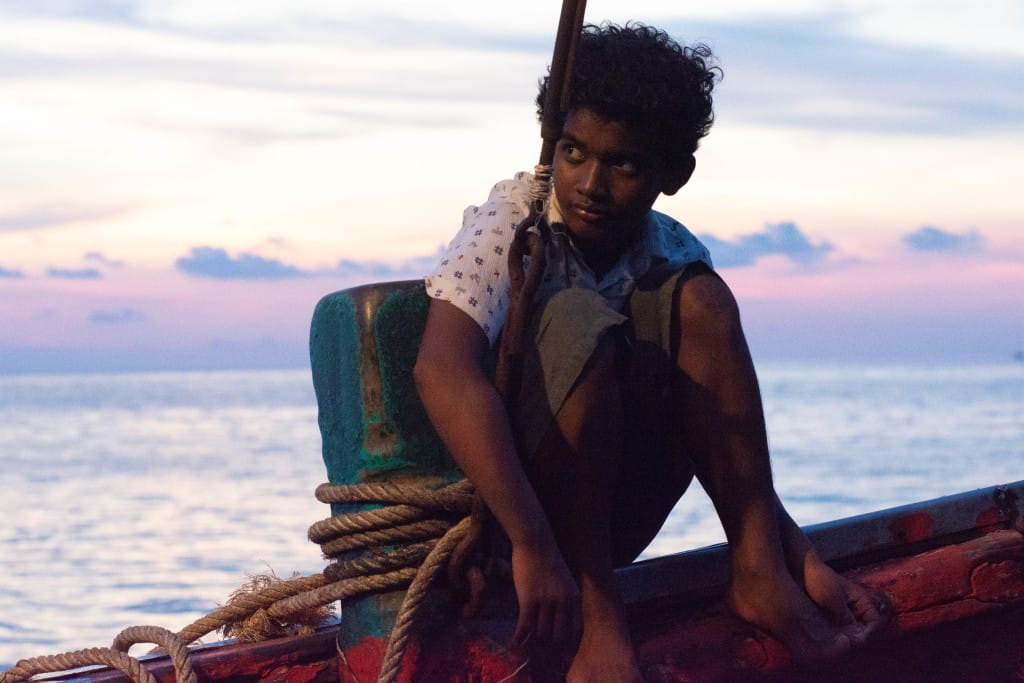Read also:
How to Watch FX Live Without CableHow To Watch AMC Without CableHow to Watch ABC Without CableHow to Watch Paramount Network Without CableRodd Rathjen’s gripping debut turns from a portrait of Thailand’s exploitative fishing industry to a haunting coming of age story.
The moment Buoyancy turns from a compelling but standard socio-political thriller into something greater than the sum of its parts comes late in the film. It’s quiet but dreadful, like the calm before a storm that’s bound to be devastating. A 14-year-old Cambodian boy named Chakra (first-time actor Sarm Heng) stands on the deck of a Thai fishing vessel in the middle of the sea at dusk. He’s there against his will after a human trafficker sells him into what is essentially modern-day slavery.
The camera is still, watching Chakra shovel endless mountains of fish. There are no cuts. The score kicks in but is barely noticeable. Chakra looks out into the water and sees a dead body casually floating by the ship. We’re not sure if the body is one of the many crew members who were murdered by the ship’s brutal captains, led by Rom Ran (Thanawut “Dam” Ketsaro) or if it’s in Chakra’s head. We just know that we’ve entered the world of the dead, and there’s no escaping unless some humanity is lost in the process.
This is the feature-length debut for Australian filmmaker Rodd Rathjen. (It’s technically an Australian production but shot in Cambodia.) It’s as confident of a first film you will find, but his one misstep here is that the commendable attempt at detailing the horrifyingly current issue of forced labor in Thailand’s fishing industry comes at the expense of important character development for Chakra, especially in the more tedious first act that slows the pacing down to a crawl. It makes for an effective, sobering documentary, but it doesn’t feel comfortable with itself as a narrative thriller until later.

When the film starts, Chakra’s depicted as just a young Cambodian looking to move to the big city to start making his own money. His motivations and internal thoughts aren’t expressed more eloquently than him telling a friend, “I want to make money”, and getting into an argument with his father at the dinner table. (Parents…they just don’t understand.) Rathjen uses Chakra as a shortcut to get to the subject matter, rather than exploring the subject matter through his choices.
Luckily, Rathjen’s direction gets more assured, and Heng’s performance comes into its own as the film progresses. The fishing vessel Chakra finds himself trapped on quickly becomes a tiny Alcatraz floating in the middle of nowhere. He shoots from great distances, dwarfed by an endless sea that isolates and traps the characters. Rathjen also chooses to keep the camera mostly still, with minimal editing, which only heightens the nightmarish sense that we can’t wake up from watching the crew members beaten, tortured, and worked to death.
The camera also never strays far from Heng’s face, who’s able to show the most genuinely sad trauma of any young actor since Charlie Plummer in Lean on Pete. His progress from bright-eyed teenage boy to a feral death machine pays off not only because of Rathjen’s meticulous design of showing small dehumanizing behaviors that add up to larger travesties but also because of the way Heng is able to get empathy from us. The more pain and injustice Chakra suffers, Heng brings us closer, even as the light leaves his eyes.
Buoyancy is a timely reminder that when you’re not treated like a human being, you stop acting like one.
A big reason for Chakra’s misery is the head captain, Rom Ran, who stands literally above everyone while behind the elevated wheel of the ship. Ketsaro gives a slaver role more nuance and empathy than it deserves, but the movie also takes note that Ran was once in Chakra’s shoes as a youth stuck in a dehumanizing situation. The choice the movie sneakily proposes is whether we help continue a cycle of oppression like Ran, or do we help dismantle it? It also helps make a villain pop when Ketsaro is able to flash a smile that’s one of the scariest things in the already scary year of our Lord 2020.
Even though it takes a while to hit its stride, it’s able to tackle heavy subject matter through a compelling, tragic twist on the Hero’s Journey. Similar to the best work of David Simon, like The Wire or Show Me a Hero, which shows how oppressive systems can brutalize innocent people, Buoyancy is a timely reminder that when you’re not treated like a human being, you stop acting like one.
Buoyancy opens in Music Box Theatre’s Virtual Cinema on September 18th via Kino Lorber.